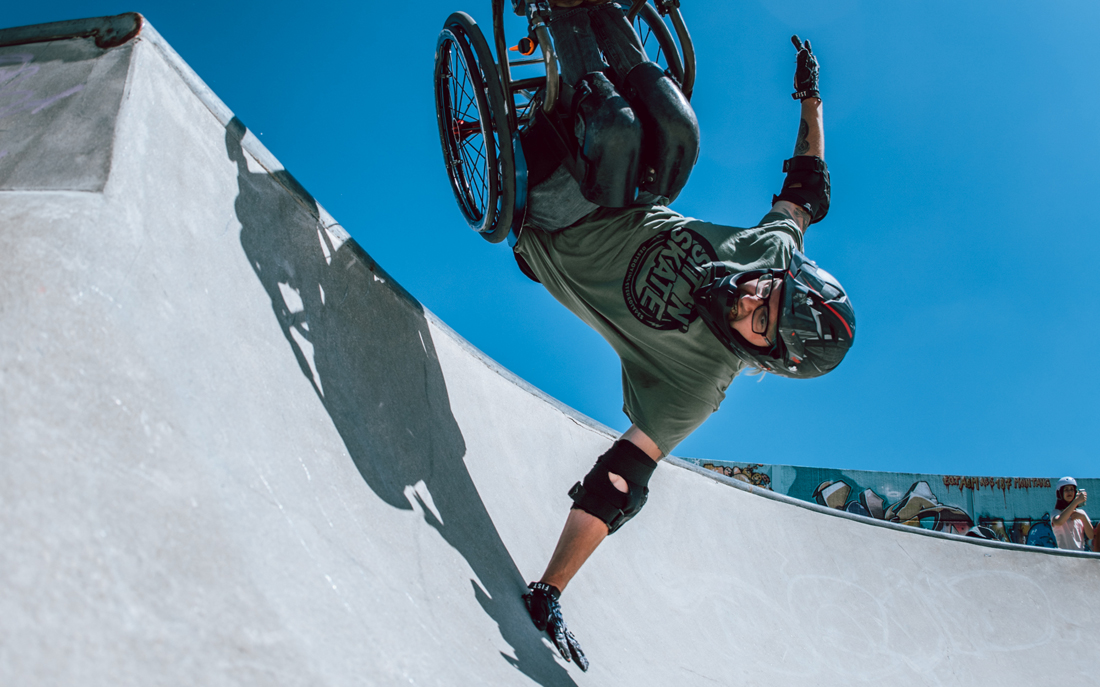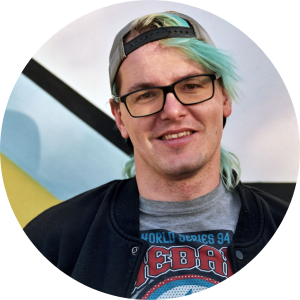“Anyone who is dependent on a wheelchair should also be able to handle it to be active and independent” – INTERVIEW

David Lebuser founded Sit’N’Skate to give wheelchair users a sense of freedom and self-realisation. The project offers wheelchair sports, training and an authentic skate lifestyle to break stereotypes and promote inclusion.
In a world where wheelchair users are often confronted with prejudices and barriers, David Lebuser has created Sit’N’Skate, a movement that doesn’t just see the wheelchair as an aid, but turns it into an instrument of freedom and self-realisation. Sit’N’Skate offers people who are dependent on a wheelchair the opportunity to train their wheelchair-handling skills and experience the skate lifestyle in a playful way. David started the project together with his wife Lisa. From the beginning, their goal was to make wheelchair sports more popular, as they recognised the positive side effects of skating with a wheelchair. In the interview, you can learn more about the history of Sit’N’Skate and David, the inspiring goals and how David and his team break down the narrative of the helpless and suffering wheelchair user through cool photos and an authentic skate lifestyle. An exciting story about inclusion, encouragement and self-determination.
What problem do you solve with SIT’N’SKATE? Why exactly does it need your solution?
Anyone who is dependent on a wheelchair should also be able to handle it to be active and independent. However, only a few people get training and often not enough. In the skate park, we can teach these skills in a playful way and at the same time strengthen self-confidence and convey the fun of movement and challenges. Another problem is the narrative of the helpless and suffering wheelchair user, which we tackle with cool photos. Destroying Stereotypes!
What did you do before you started the current project/company?
I was a rehab consultant at a children’s medical centre. So there too I worked on mobility for children in wheelchairs, just on the provider side. Today I do it more as a coach and role model and practice with the kids how to use the wheelchair.
What or who motivated you to become a social entrepreneur?
In the beginning, it was just a hobby, then a sport and the first motivation was simply to make this new sport better known. But I quickly noticed the many positive side effects that came along with it. And so, together with my wife, I founded SIT’N’SKATE to create a low-threshold opportunity to go skating with a wheelchair. Everything is as authentic as possible in the skate lifestyle with a pinch of punk rock.
Which of your successes do you remember most?
Especially in the last three years, we could really achieve something. That’s mainly because we got involved with SUPR SPORTS and are now recognised as a non-profit organisation. With the help of appropriate funding, we were able to establish regular programmes in Hamburg, Hanover, Bremen and Dortmund. And because of the regularity, we can now work with the kids in the long term and see how they develop into self-confident and independent young people and adults.
Were there any moments that were particularly challenging and what did you learn from them?
The financial situation is always particularly challenging. From the beginning, it was important to us that our services would stay cost-free as far as possible and that we would receive the funds we need through grants and donations. But now that we have three regular and ongoing programmes, we also have to raise money for them on a regular basis. Funding is often only available for new project ideas, so keeping our ongoing and functioning services alive becomes increasingly difficult.
 © David Lebuser / Michael Lang
© David Lebuser / Michael Lang
„The world needs more accessibility, more opportunities for participation and more justice in general.“ — David Lebuser, Co-founder of SIT’N’SKATE
Where should the journey go in the future and what are the next big goals?
We want to make the structures more professional and develop SIT’N’SKATE further with the hope that we can also start other offers here and elsewhere and establish them in the long term. For this, however, we need a larger full-time and voluntary team, which presents us with new challenges, both in terms of financing and recruitment. That’s why we are currently working on training and similar ideas to spread our idea.
What do you wish you had known before launching your project/company? What advice would you give to others along the way?
We are very pragmatic and sometimes a bit quick to just do it. That was good in the beginning and still drives us to start things that others can’t imagine or don’t dare to do. In hindsight, you are often wiser, and developing one or the other idea first and matching it with long-term financing possibilities might have helped us avoid some of the difficulties we are facing today.. Apart from that, I still say: Just do it!
What podcast do you listen to regularly? What book is an absolute must-read for you personally?
I’m more of a music guy and I listen to punk rock in different eras and facets. I don’t have a regular podcast, but I like to listen to Die Neue Norm, Hobbyquerschnitt or Raul Krauthausen when I’m driving because I also like to listen to what’s going on elsewhere with committed people with disabilities, what topics are important at the moment and I can also get relevant information for my own projects.
What are your tips for doing good in everyday life? Where do you find it rather difficult to live sustainably?
When in doubt, less is sometimes more. It doesn’t always have to be a big event, but a small offer or a simple course can add real value. Of course, you don’t have to start something yourself, you can also volunteer. I try to be an ally in matters of climate, LGBTQ rights, anti-racism and so on. Nevertheless, I find it difficult to consistently inform myself in everyday life and to live sustainably. I think you just have to keep working on yourself.
Which organization or start-up impresses you the most and is a true role model for you?
I know a lot of good social skateboarding projects, especially thanks to Goodpush, a project by Skateistan. They do a great job of networking these skate projects and equipping them with knowledge. But I also think small projects like wheelchair tours are great. Because as I said, I think it’s better to have many small projects than just a few big ones.
Complete this sentence: The world needs more…
… less. Higher, faster, further, more and more… I think this approach is ruining our world. I think this approach is driving our world to ruin. But to answer the question correctly: The world needs more accessibility, more opportunities for participation and more justice in general.
Is there anything else you would like to share?
I would like to invite you to visit us live and to come to one of our regular wheelchair skate meetings or other events.
In our new magazine format, we interview interesting entrepreneurs and focus on their ideas and their very personal stories. The interviews are intended to inspire, motivate and encourage people to put their own ideas into practice.
You know an exciting founder or entrepreneur we should interview? Write to us!
Andreas Renner, Co-Founder GOOD: andreas@good-search.org
We support SIT’N’SKATE in July 2023 with the proceeds of GOOD. Find out more on the project page:

